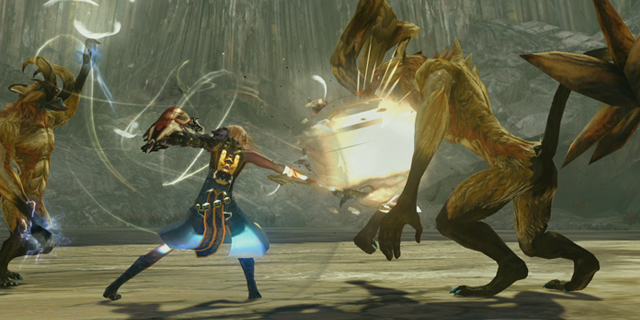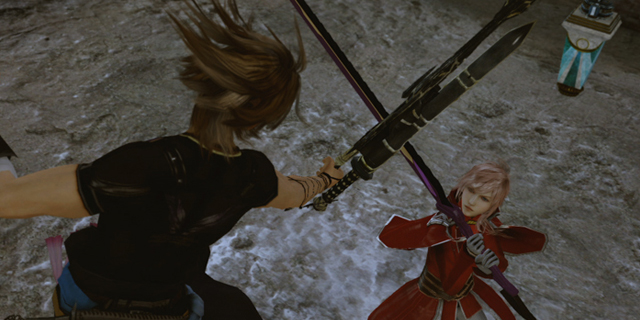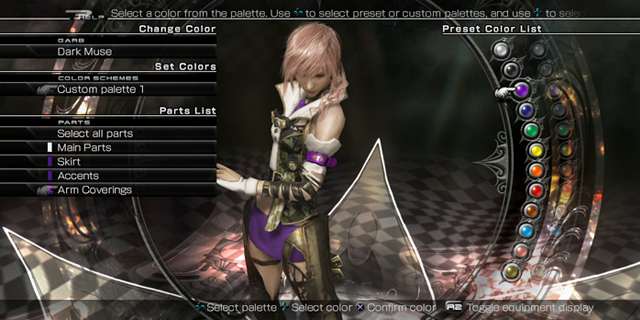
After four years and two initially-unplanned sequels, the tale of Final Fantasy XIII is at last complete. Set centuries after the events of XIII-2, Lightning Returns: Final Fantasy XIII gives Lightning thirteen days to save humanity from the end of the world. A harder task still may be saving the series from wearing thin after its less-than-universally-loved predecessors.
The story in Lightning Returns is very cryptic and difficult to follow, and the game makes little effort to try and explain the events of the first two titles. Much of the original cast is present, but seem to serve simply as objectives more than anything else, only appearing for their specific part of the game then having little to do with the overall plot.
Despite the narrative limitations, Lightning Returns maintains the style you expect from the XIII series. If you like the setting and feel of the previous games, this will scratch that itch in all of the right ways. If you weren’t a fan before, nothing about this game is going to convert you.

Lightning retains her stoic demeanor, and this starts to detract from the experience during the few attempts at breaking up the drama with humor. It feels like a jarring change of pace for Lightning to suddenly be funny, and it doesn’t match her attitude at all. And even with the entire game devoted to her character, Lightning doesn’t get nearly as much development as you might expect. In XIII, this was less of a problem, as Lightning was simply one piece of a larger cast. The game starts with the events since XIII-2 largely unexplained, and quite a bit of that time never gets fleshed out. The hope was that Lightning might mellow out a little as Returns‘ sole protagonist, but she maintains the same attitude throughout the game, making her interactions with most other characters awkward and unpredictable.
Lightning Returns isn’t exactly an open-world game, but it’s far closer than the previous games in the series. Many things happen in a very linear fashion, but the game doesn’t do much to restrict your movement. However, the time-limited nature of the game tends to discourage needless exploration and focus on the task at hand. I like the freedom after the restrictions given during the first two games, but the world still feels a bit empty without a ton of side stuff to do; time limits in games, no matter how long they are, always manage to discourage exploring side content. There are plenty of side quests, many functioning simply as a means of progressing combat strength.
Combat mechanics are the biggest change from XIII-2. The move away from traditional role-playing staples toward more action-oriented mechanics is fun, and sets the game apart from its predecessors. RPG trappings can be a needless obstacle of sorts, hindering you as you make your way through the story.

Furthermore, Lightning’s progression and leveling come from quest completion, rather than from defeating enemies. While this places more importance on objectives, it can make some battles feel like obstacles to be avoided, especially with certain difficult enemy types. In an action-oriented game, it’s interesting to shirk the idea of simply “grinding enemies” for experience, but battles don’t feel all that important here.
The entire Final Fantasy XIII series has been a transition for the big-budget home console Japanese RPG. Console games have become more cinematic and grandiose, and audiences expect flashier visuals, larger stories and faster gameplay. In changing to suit these expectations, the genre has also dropped a few staple mechanics. Along the way, Final Fantasy XIII has, if nothing else, polarized its fanbase. Many developers and fans of the traditional RPG style have moved to handhelds, but the XIII games show that the genre still has a place on home consoles, even if it has to undergo a fundamental change to its core mechanics. Lightning Returns may feel like an action game, but it’s still very Final Fantasy: the series has, after all, featured great changes to game mechanics in every installment.
Pros: Fast combat, more open environments
Cons: Confusing plot, lack of character development



















